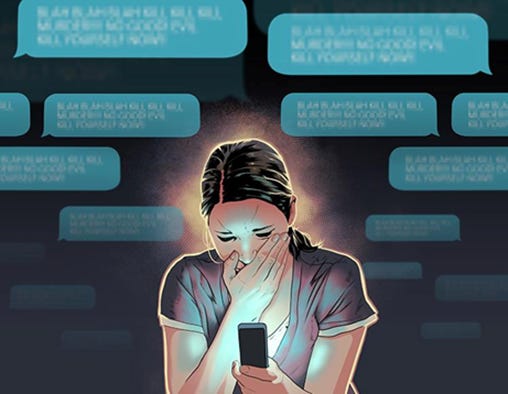Keep your kids safe online
When it comes to social media and today’s youth, there are some major issues regarding how much power and influence it has on younger people’s lives. It has changed the way people socialize and interact with each other. Unfortunately, youth who spend a lot of time on social media may be more prone to feeling isolated and disconnected and at risk of exploitation. There are websites that can affect a young person’s health but glamorize a certain behaviour that will have negative consequences.
What are some ways that parents can protect their children from the issues that arise from social media and harmful websites? First and foremost, they can educate their children by informing them to be very hesitant and careful about what they see on social media. Parents can also limit the amount of time they spend on the internet and control what sites are visible through parental control settings.
George Labossiere, Inspector
Community Relations Division
As we watch the closing arguments this week in the trial of Aydin Coban, accused of exploiting 15-year-old Amanda Todd over the internet, that ultimately led to her suicide, we look at the safety and crime prevention education and awareness initiatives of the Winnipeg Police Service to keep our kids safe online.
The article, which appeared this week in the Service’s E-Watch newsletter, is part of the TakeAction program designed to enhance community safety by educating our community on easy, practical steps they can take to develop a personal safety strategy.
The Service supports the TakeAction program by proactively promoting public education and awareness on ways to prevent crime through crime awareness presentations.
Besides the weekly E-Watch newsletter, our Crime Prevention team can connect with community groups through in-person and online virtual presentations.
Presentations offered by the Winnipeg Police Service include:
• Active shooter workplace safety
• Crime awareness
• Drug awareness
• Frauds and scams
• Introduction to the Winnipeg Police (newcomers).
• Personal safety
• Personal safety for seniors
All presentations are free of charge, most are one hour in duration. Upon receiving your Speaker Request Form, a representative of the Service will be in contact to make arrangements.
Keep your kids safe online.
Kids today can go online from so many different sources, including video game consoles, tablets, smartphones and even handheld gaming devices. Young people are increasingly living their lives online, and their digital devices are some of their favourite toys and tools.
Teaching internet safety in the elementary years will have lasting rewards for you and your kids.
Internet Safety Basics
Never share their names, schools, ages, phone numbers, or addresses
Never send pictures to strangers
Keep passwords private (except to parents)
Never open email from strangers – it may contain viruses that can harm a computer
Immediately tell an adult if something mean or creepy happens
Strategies for a safer online life
Visit only age-appropriate sites. Check out the site before your kids visit it. Know what features and what content exists, and make sure they’re good for your kids
Search safely. Use safe search settings for young kids or think about applying filtering software to limit appropriate exposure.
Avoid strangers. Tell your kids that people aren’t always who they say they are in cyberspace. Explain that if someone they don’t know talks to them, they shouldn’t respond but should always let you know.
Be a good cyber citizen! Remind kids that an internet playground is still a playground, and they need to play nicely. A good rule of thumb: if they wouldn’t do something in real life, they shouldn’t do it online.
Keep the computer in a central place so you can see what’s going on.
Establish expectations and limits about the amount of time your children spend online and what they do.
View your own habits carefully. You are their role models.
Be involved and have fun with them! Start by showing interest in the sites they visit and the games they play, and your job will be a lot easier when they start exploring these technologies more independently.
For further info, training aids and presentations for parents, kids and educators can be found on the Canadian Centre for Child Protection website.
The below link is a Facebook presentation for parents on Social Media and Online Gaming Safety that was hosted by the Winnipeg Police Service, where information on the following topics was shared:
the most popular online platforms being used
some of the dangers and pitfalls these platforms have for young people; and
how you, as a parent, guardian or educator, can help keep your kids safe when they are online.
https://www.facebook.com/wpgpoliceofficial/videos/1409848112557140/
Every member of the community should be on the lookout for a potentially bad situation. We all have a role to play in Safety and Crime prevention. TakeAction
Subscribe to our weekly E-Watch newsletter, your direct connection to information about crime and crime prevention in your community. Stay informed and help us create a culture of safety in Winnipeg.




